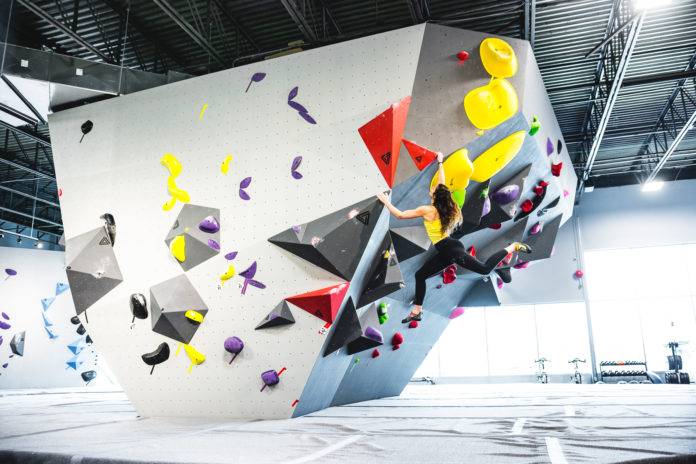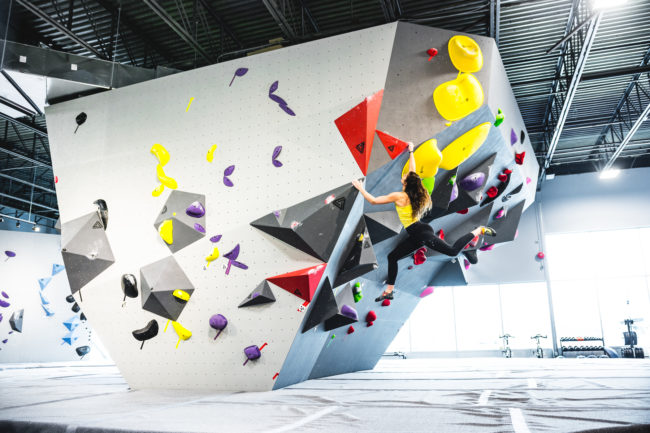
Born from Passion
Delire Climbing started over 15 years ago in a tiny apartment in Quebec City, Canada. Lisa Lajoie, a dedicated climber who studied industrial design, and Jeff Beaulieu, a climbing instructor who taught Lisa an intro to rock climbing course, began making and selling resin climbing holds. Their passion and drive eventually motivated them to open a gym in Beauport in 2008, and at that time they brought in Vincent Légaré to be the gym’s CEO. Since then Delire has grown exponentially. The company now employs over 80 people, owns and manages three gyms in Quebec City; manages a factory that produces artificial climbing structures, adjustable training structures, mats and volumes; and consults on gym design, renovation, and management.
The passion for the sport of climbing that drove Lajoie and Beaulieu to form Delire Climbing continues to motivate the company today. Hands-on experience with all of their products drives most of Delire’s research and development, which never gets too theoretical or separated from the act of climbing itself.
“One of our main advantages is that we have three climbing gyms that also function as laboratories,” said Delire founder Lisa Lajoie. “They are research and development spaces for our company. We run internal tests on our most demanding client: ourselves.”
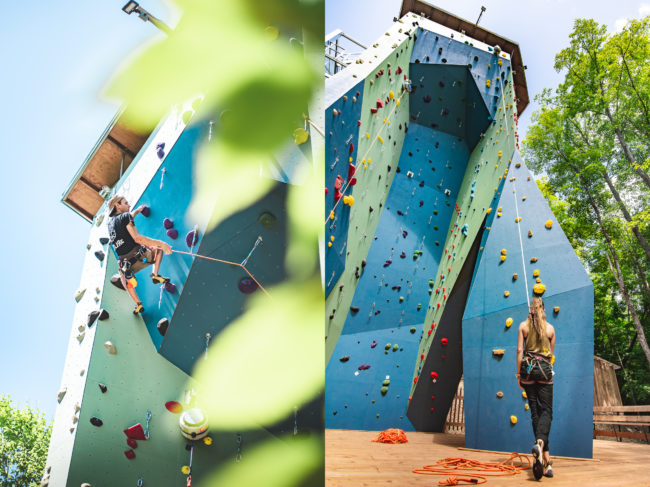
Healthy Bodies and Minds
Running three successful climbing gyms gives Delire employees special insight into what will work and what won’t as they design and construct gym interiors. The company intimately understands what is involved when building successful climbing environments, like the importance of resting and gathering spaces throughout a gym, and other spatial considerations such as locations for cleaning holds, reception, and stocking. This allows gym designs to be tailored towards the needs of climbers, which in turn results in the gym’s popularity— a win for gym owners.
Delire Climbing has a 4-prong mission: it prides itself on 1) expertise, 2) experience, 3) raising the bar throughout the industry, and 4) taking human needs into consideration. The human element applies to clients, climbers, and employees. Internally, the company strives to improve the work environment.
“We try to be creative and modern in the way we manage our employees. Telework, work-family-travel balance, and incentives for active commuting and training are some of our out-of-the-box benefits,” said Lajoie. “‘Gone Climbing’ is our mentality: a healthy mind in a healthy body!”
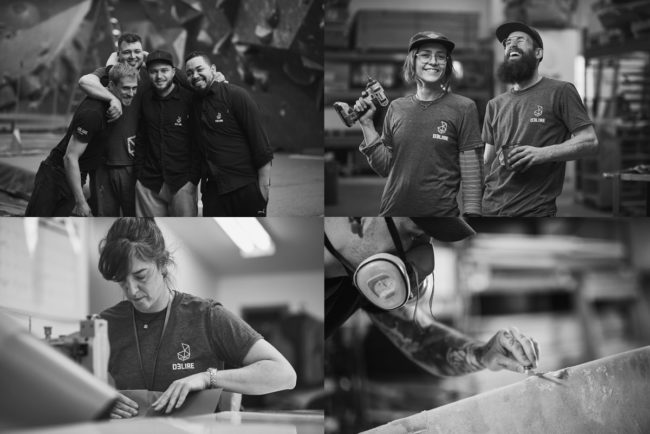
Externally, Delire puts a great deal of effort into pleasing clients. “We think long-term; we wish to carry out our client’s current project as well as their next,” Lajoie said. “With that in mind, our recommendations aim to ensure our client’s success.”
Delire can take a project that is only a glimmer of an idea in a client’s mind and bring it to completion, all the way from design through installation and implementation of a computer management system. Delire employees even undertake the first round of route setting so that the gym can have a successful opening while the owner focuses on other important issues, such as staffing and cultivating clientele. Starting with the client’s dreams, the company determines how much space is needed for the climbing structures as well as the other important areas inside the gym. Designers work with the client to very clearly determine who the target market is, and design decisions are made about how to best serve the needs of those climbers. Then initial drawings are delivered to the client.
Once the design has been approved, Delire begins ordering and manufacturing materials. When the space is ready, the company sends an installation team to construct the gym’s interior. Finally, consultants help the client develop hold management systems, which will aid the gym as it matures.
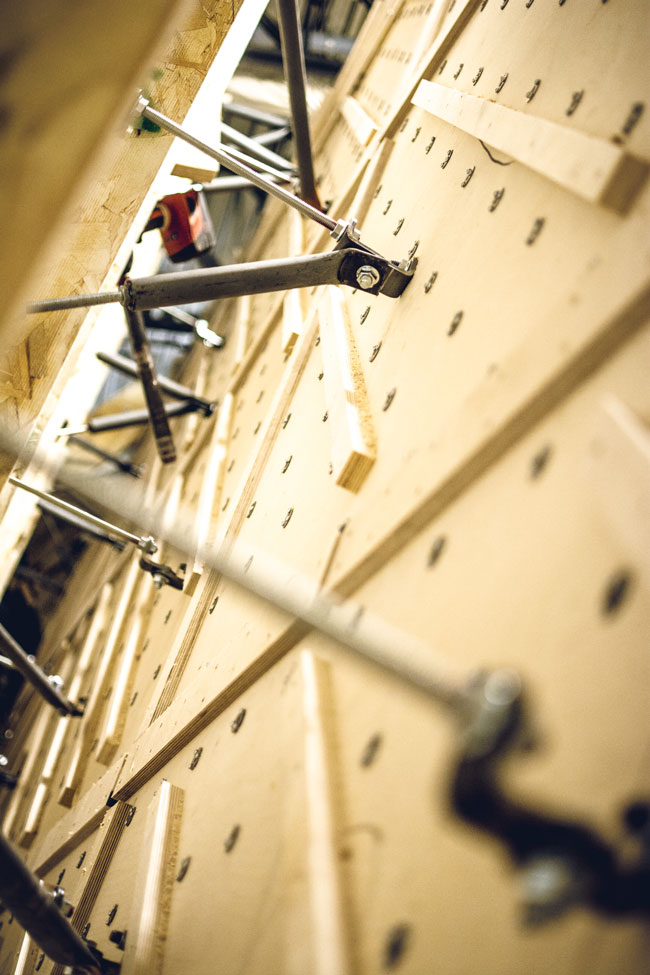
Healthy World
As part of Delire’s dedication to raising the bar throughout the industry, the company emphasizes reducing its carbon footprint through its material choice and by using local suppliers. As one example, Delire developed new bouldering mat covers made entirely out of recycled plastic bottles. These covers are produced locally in Quebec through a process that uses low amounts of energy. This material lasts longer than vinyl, which needs to be replaced every two years, and it requires less water to wash and maintain. These mat covers use far less resources than vinyl mats over the life of the product.
Delire uses Canadian wood in all of its structures rather than steel sourced from Asia, the common choice. This wood is a resilient, lightweight material that allows for easier and less expensive modifications and transportation. Being sourced locally in Canada greatly reduces the resources used in shipping. Additionally, the company has developed reusable transportation crates for its climbing surfaces in order to produce less waste.
Finally, Delire is eager to accept gym renovation projects that others may refuse. Designers determine which elements are still serviceable and reuse them in the renovation. This avoids the need for excessive manufacturing of new materials, reduces waste, and saves energy. It also saves the client money. Decisions like this are less profitable for Delire but fulfill the company’s goals of improving the climbing industry and considering the human needs related to its process and products.
“We wish to define the sport’s standards for tomorrow,” said Lajoie. “We wish to offer future operators the possibility of choosing the unique quality and experience of a company that designs, installs and operates climbing gyms, while allowing them to make an ethical choice for now and for the future.”
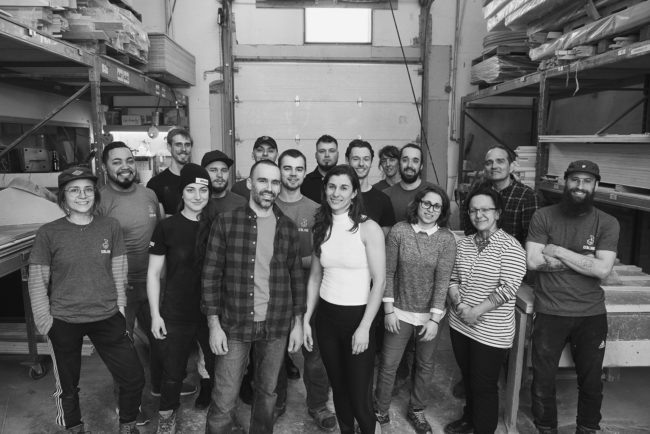
.

DÉLIRE Climbing Walls designs and builds sustainable climbing walls and gyms of the highest quality and integrity and is the manufacturing arm of DÉLIRE Escalade, which operates multiple indoor climbing gyms and an outdoor bouldering gym in Quebec, Canada.




